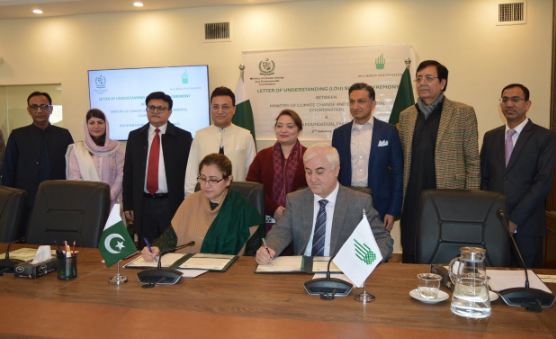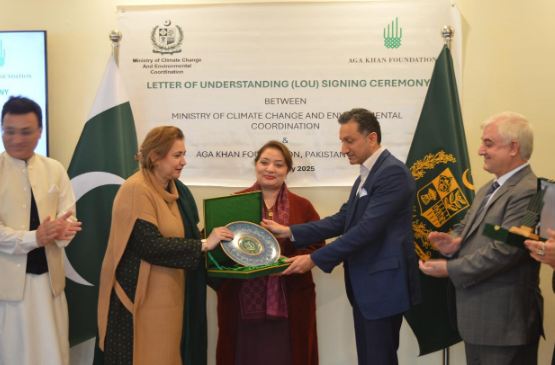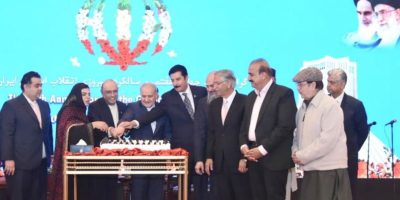Pakistan-AKF agreement targets climate resilience in GB, KP, and Sindh

ISLAMABAD, JAN 3 /DNA/ – The Ministry of Climate Change and Environmental Coordination (MoCC),Government of Pakistan and the Aga Khan Foundation, Pakistan (AKF-P) signed a letter of Understanding to collaborate on livelihood security of the people living in rural areas of Pakistan including coastal areas of Sind and rural areas of Gilgit-Baltistan and Khyber Pakhtunkhwa.

The signing ceremony took place at theMinistry of Climate Change and Environmental Coordination where senior officials from the Ministry including Ms. Rumina Khurshid Alam- Coordinator to the Prime Minister on CC & EC, Secretary – Ms. Aisha Humera Ch. and from Aga Khan Foundation, Pakistan, Mr. Amin Feerasta, Chairman of National Committee AKF, Pakistan, Mr. Akhtar Iqbal, Chief Executive Officer of AKF, Pakistan, Ms. Laila Naz Taj, Director, Aga Khan Development Network (AKDN) Pakistan Communications, Mr. Irshad Khan Abbasi, Programme Advisor, Rural Development, Civil Society and Habitat and Mr. Naveed Sethi, Chief Financial Officer, AKF Pakistan participated in the event.Pakistan faces significant climate-related challenges, particularly in the coastal areas of Sindh and the mountainous regions of Gilgit-Baltistan and Chitral (GBC). These areas are grappling with extreme weather events, glacial melting, rise in sea-level, agricultural vulnerabilities, and water scarcity, all of which threaten the livelihoods and well-being of communities. The Ministry acknowledges the need for targeted action to mitigate these impacts and support the socio-economic development of these regions.Recognizing the urgent need to address the growing challenges of climate change in Pakistan’s vulnerable regions, the Ministry of Climate Change & Environmental Coordination (MoCC&EC) and the Aga Khan Foundation, Pakistan (AKF-P), have signed a Memorandum of Understanding (MoU) to enhance resilience and promote livelihood security in rural and underserved areas.
Through this agreement, the two entities will be able to strengthen cooperation on sustainable socio-economic development and address the challenges related to climate change.The partnership will focus on programmes to advance climate-related initiatives,promote knowledge sharing, coordination, research, joint activities, capacity building, policy support and joint resource mobilization. It will also create important synergies and opportunities through closer relations.Ms. Rumina Khurshid Alam Coordinator to Prime Minister on climate change while speaking at the ceremony, highlighted the critical role of this partnership in achieving Pakistan’s climate and development objectives. “This Letter of Understanding represents a significant stride toward addressing climate vulnerabilities and fostering sustainable livelihoods for communities most affected by climate change. Through this collaboration, the government’s efforts to promote inclusive, climate-resilient socio-economic development will be further bolstered,” she stated.Mr.Amin Feerasta, Chairman of National Committee AKF, Pakistan, noted,“On behalf of Aga Khan Foundation and broader Aga Khan Development Network (AKDN), we thank the Ministry of Climate Change and Environmental Coordination for this partnership which will build synergies to address the most pressing challenge of the time. Environment and Climate is a core strategic priority and crosscutting theme for Aga Khan Foundation and allAKDN agencies. Our environment and climate-related efforts are guided by the principle of responsible stewardship of the environment, ensuring that the Earth can sustainably support future generations.”Mr. Akhtar Iqbal in his concluding remarks thanked the Ministry and shared,“This partnership will open significant opportunitiesto collaborate on addressing climate change through joint efforts focused on mitigation and adaptation measures. This includes providing technical support, assisting in international climate processes, developing national and sub-national strategies, and implementing community-based projects.”
Related News

President warns escalation involving Iran could destabilize region
DNA ISLAMABAD, President Asif Ali Zardari on Wednesday welcomed the efforts aimed at easing tensionRead More

Ex-COAS Bajwa admitted to ICU
News Desk RAWALPINDI: Former army chief Gen (retd) Qamar Javed Bajwa was admitted to theRead More


Comments are Closed